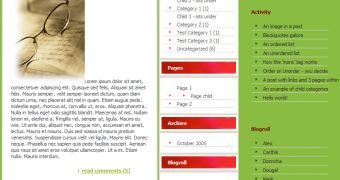We can consider that the most simple website structure in the WEB 2.0 era is denoted by blogging development platforms. In case of ready made web applications, the blog functionality can be left like the one defined by installation default settings or could be enhanced through plugins or add-ons.
Let's consider the case of WordPress and Drupal CMSs (Content Management Systems) which can be used as blogging platforms. These two PHP / MySQL based applications are widely used and due to their features are very popular. Both of them are free and easy to install. Regarding the customization part or the blog setup, there are a few major differences between Drupal and WordPress.
In order to control the behavior and appearance of a WordPress blog, there are only a few number of adjustments to be performed in the application backend. These operations do not require programming knowledge, and even more, the default WordPress installation will generate a fully functional blog, without major code modifications being necessary to customize a template or to optimize the webpages URLs for search engines spiders.
On the opposite, Drupal is a content management system with many additional features. The websites made on Drupal platform have native enhanced functionalities and the overall system configuration requires that the webmaster must control very well the HTML, CSS and PHP techniques in order to achieve an optimal website behavior in interaction with its visitors. Practically, Drupal was not made only for blogging. Based on Drupal, you can build virtual stores, community web portals and more. It will allow you to build multiple blogs on the same website in a collaborative authoring environment.
According to your blogging needs, you should always select any platform that provides simple configuration mechanisms, good community support and minimal web hosting requirements. As a consequence, you must establish from start the further intentions of adding other website functionalities, which cannot be achieved on a simple blog platform, even if modules and plugins exist. The optimal website functioning parameters will be always obtained on a platform dedicated to a specific development purpose.

 14 DAY TRIAL //
14 DAY TRIAL //